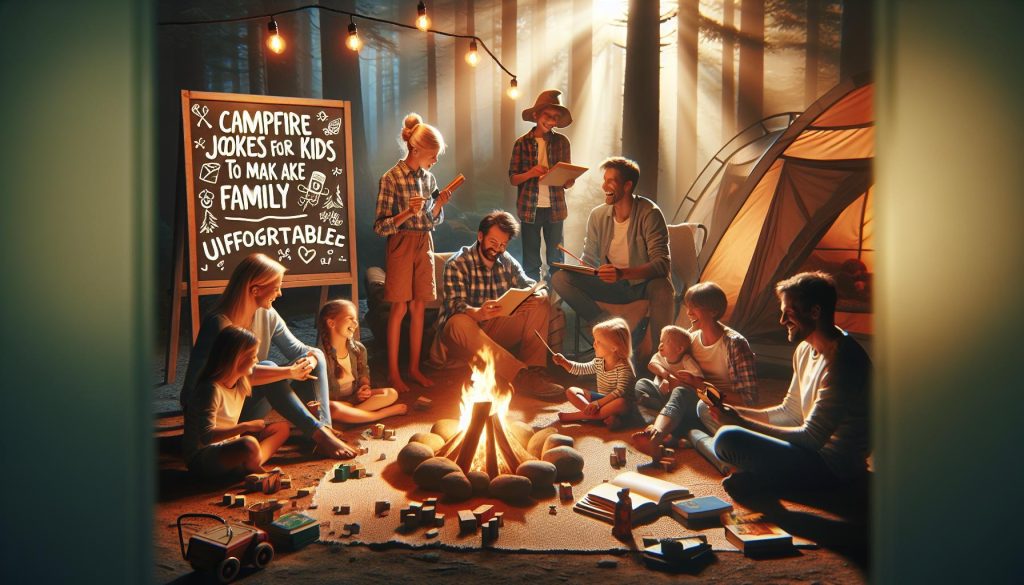Campfire Jokes for Kids to Make Family Nights Unforgettable
Gather ’round the fire, folks! If you’re looking to transform your family nights into memorable adventures filled with laughter and joy, look no further than the delightful world of campfire jokes for kids! Imagine the crackling flames illuminating smiling faces as everyone roars with laughter at silly punchlines and goofy setups. Not only do these jokes serve as a fantastic way to break the ice, they also create a bonding experience that your family will cherish for years to come. Get ready to unleash the giggles and spark unforgettable memories—because what better way to enjoy s’mores and stories than with a hearty chuckle? Dive into our handpicked selection of campfire jokes and prepare for an evening of joy, creativity, and more than a few eye-rolls at the corny puns!
Understanding the Importance of Laughter in Family Bonding
Laughter serves as a vital glue that binds family members together, creating a warm and inviting atmosphere that fosters deeper connections. It is indeed through shared humor that families can break down barriers, ease tensions, and create lasting memories. Engaging in laughter during family gatherings, such as campfire nights, encourages open communication and strengthens the emotional ties between each member.
Research indicates that humor has numerous psychological benefits, including reducing stress and anxiety. When families laugh together, they not only elevate their mood but also develop a sense of camaraderie that enhances their resilience during challenging times. Here are some key reasons why laughter plays an essential role in family bonding:
- Encourages Open Communication: Jokes and light-hearted banter can pave the way for discussing serious topics without discomfort.
- Boosts Family Cohesion: Shared laughter fosters unity and a sense of belonging within the family unit.
- Creates Positive Memories: Humor makes experiences memorable, transforming ordinary nights into unforgettable adventures.
- Promotes Emotional Well-being: Laughter releases endorphins, helping family members feel happier and more connected.
Incorporating jokes into your family nights can amplify these effects. Consider creating a fun atmosphere by compiling a list of top child-friendly campfire jokes. Here’s a simple table that could inspire your choice of humor:
| Joke | Response |
|---|---|
| why did the scarecrow win an award? | Because he was outstanding in his field! |
| What do you call cheese that isn’t yours? | Nacho cheese! |
| Why don’t skeletons fight each other? | They don’t have the guts! |
| What do you call fake spaghetti? | An impasta! |
Utilizing jokes like these during family gatherings not only promotes laughter but also encourages participation from all ages,making everyone feel included.By participating in these humorous moments, families can create a collaborative space where bonds grow stronger, memories are cherished, and laughter becomes a cherished family tradition.
Choosing Age-Appropriate Jokes for Maximum Fun
When planning a night filled with laughter around the campfire, selecting the right jokes for your audience is crucial.Age-appropriate humor not only keeps kids engaged but also ensures that everyone feels included and has a great time. Here are some tips for curating the perfect mix of jokes:
- know Your Audience: Tailor jokes to the age group of the children present. Younger kids might enjoy silly, one-liner jokes, while older children might appreciate a little more complexity in their humor.
- Avoid sensitive Topics: Steer clear of humor that could potentially offend or confuse. Jokes referring to themes of violence, bathroom humor, or anything beyond their comprehension can detract from the fun.
- Test the Waters: Use anecdotes or funny stories as an icebreaker before diving into jokes. It helps gauge the audience’s response to different styles of humor.
- Encourage Participation: Jokes that invite kids to participate or respond can elevate the enjoyment.Consider riddles or jokes with open-ended questions that prompt creative answers.
Here’s a fast reference table to illustrate some suitable jokes for different age ranges:
| Age Group | Joke Example |
|---|---|
| 5-7 Years | What do you call a bear with no teeth? A gummy bear! |
| 8-10 Years | Why did the kid bring a ladder to school? Because he wanted to go to high school! |
| 11-13 Years | Why don’t scientists trust atoms? Because they make up everything! |
By thoughtfully selecting jokes that align with children’s ages and interests,you can create an habitat filled with joy and bonding. Remember, the goal is to foster laughter and connection, making your family nights around the campfire truly unforgettable.
Crafting the perfect Campfire Atmosphere for Storytelling and Humor
To create an enchanting campfire atmosphere that sets the stage for laughter and storytelling,focus on several key elements. Start by ensuring that the fire is well-maintained, providing a soft glow that not only offers warmth but also a mesmerizing focal point. Safety first: always supervise children around the flames, and have water or sand nearby for safety measures. Surround the fire area with comfortable seating, perhaps brought from home or a collection of blankets and pillows that invite cozy gatherings.
Next, consider the surrounding ambiance. Music can elevate the mood—opt for soft acoustic tunes or nature sounds that blend harmoniously with the crackling fire. A clear night sky adds to the experience; encourage your family to gaze at the stars, sparking discussions about constellations and space. To enhance the vibe further, hang string lights or lanterns that twinkle in the background, reminiscent of fireflies flickering in the dusk.
As for the storytelling elements, engage everyone by encouraging interactive storytelling. This can be done through characters developed collectively or silly twists added to classic tales. Create a space where family members feel comfortable sharing, making them eager to contribute their favorite jokes or funny stories. Using props or costumes can add an extra layer of fun, transforming regular anecdotes into unforgettable performances under the stars.
To keep the humor rolling, introduce a list of easy-to-remember, kid-friendly jokes. Here’s a little treasure trove to spark giggles:
| Joke | Punchline |
|---|---|
| Why don’t scientists trust atoms? | Because they make up everything! |
| What do you call a bear with no teeth? | A gummy bear! |
| Why did the kid bring a ladder to the campfire? | Because they wanted to reach new heights! |
| What did the dalmatian say after lunch? | That hit the spot! |
Tips for Delivering Jokes Effectively to engage All Ages
To ensure your jokes resonate with family members of all ages, timing and delivery are key.Here are some effective strategies:
- Know Your audience: Tailor your material based on the age group present. For younger kids, opt for silly and simple jokes, while teenagers might appreciate a clever twist or puns.
- Use Facial Expressions and Voice Modulation: Engage your audience with animated facial expressions and varied vocal tones. this keeps the energy high and signals that the punchline is approaching!
- Pause for Effect: A well-placed pause can build anticipation and make the punchline hit harder. Timing is everything; don’t rush through!
- Encourage participation: Involve your audience by asking them to guess the punchline or finish the joke. This makes the experience interactive and more memorable.
Using props or gestures can also make your jokes come alive. Here’s a simple table showcasing some great props for specific jokes:
| Joke Type | suggested Prop |
|---|---|
| Animal Jokes | Stuffed animal |
| Puns | Bookmark with puns written |
| Knock-Knock Jokes | Mini door prop |
| Food Jokes | Fruits or snacks to share |
Lastly, always gauge responses. If a joke lands well, build on that humor; if a joke falters, don’t dwell on it—move on to the next one with confidence. It’s all part of the fun, and laughter is the best way to create lasting memories around the campfire!
Incorporating Interactive Elements to Enhance the Campfire Experience
To elevate the campfire experience, integrating interactive elements can make your family nights truly memorable. Engaging the whole family through activities that encourage participation not only enhances the atmosphere but also fosters connection and laughter. Here are some ideas to consider:
- Joke Time Rotation: Allocate specific moments during the evening for each family member to share their favorite jokes. This not only keeps everyone engaged but also gives each person the spotlight, helping to build confidence and communication skills.
- Story Building Games: Kick off a story with a funny premise and let each family member add a line, continuing until the tale reaches its hilarious climax. This activity not only sparks creativity but can also lead to unexpected and amusing outcomes.
- Campfire Charades: Introduce a game of charades with a campfire twist, where everyone acts out familiar characters or themes from kids’ stories and movies. This interactive game gets everyone moving and laughing while being simple to set up.
- Silly Songs Challenge: Encourage spontaneous song creations by mixing familiar tunes with silly lyrics related to campfire themes. You might just discover a family tune that becomes a tradition!
| Activity | Purpose |
|---|---|
| Joke Time Rotation | Encourages sharing and public speaking. |
| Story Building Games | Promotes creativity and teamwork. |
| Campfire Charades | Enhances physical activity and fun. |
| Silly Songs Challenge | Fosters creativity and laughter. |
By incorporating these interactive elements, your campfire gatherings will not only be enjoyable but also a catalyst for creating unforgettable family memories. The laughter generated and the bonds strengthened around the fire will be cherished for years to come,making each family night a unique celebration of togetherness.
creating a Family Joke Book to Preserve Memorable Moments
Creating a family joke book is an excellent way to capture the laughter and joy shared during memorable moments. This collaborative project not only deepens family bonds but also serves as a lasting keepsake that generations to come can enjoy. Here’s how to get started:
- Gather Contributions: Ask each family member to contribute their favorite jokes, funny anecdotes, or even silly cartoons. This can create a sense of ownership and excitement about the book.
- Choose a Theme: Consider organizing your joke book around themes such as ‘Outdoor Adventures’, ‘Holiday Humor’, or ‘Animal Antics’. This will add a playful structure and make it easier to find jokes later.
- Include Illustrations: Illustrate jokes with simple drawings or invite children to create doodles. Visuals will enhance the reading experience and bring the jokes to life.
- Document the Stories: Alongside the jokes, include little stories or memories associated with certain jokes or family trips. This personal touch can enrich the context and serve as a fantastic way to reminisce.
Formatting your joke book can be just as fun as creating the content. Here’s a simple table format you might find useful:
| Joke | source | Memory/Story |
|---|---|---|
| Why did the teddy bear say no to dessert? Because it was already stuffed! | Dad | Remember that camping trip where Dad kept telling this joke around the fire? |
| What do you call a bear with no teeth? A gummy bear! | Emily | This became Emily’s favorite joke after she told it to her friends at school. |
Once your collection is complete, consider printing it with colorful pages or even binding it into a small book. Encourage family members to read a joke or two during family gatherings or game nights. The laughter that echoes through your home can foster an atmosphere of joy and connection,ensuring that these light-hearted moments are preserved for years to come.
Exploring the Benefits of Shared Laughter for Family Relationships
shared laughter acts as a unifying force that can substantially strengthen family bonds. When families engage in humorous activities, such as telling jokes around a campfire, they create a shared experience that fosters connection. The act of laughing together encourages open communication and builds trust among family members, making them feel more comfortable in expressing their thoughts and feelings.
Moreover, laughter has been shown to reduce stress and anxiety, which can be beneficial for maintaining a positive family atmosphere. Families that enjoy humor together tend to navigate challenges more effectively, as they learn to rely on each other for support. Here are some key benefits of shared laughter:
- Enhanced Relationships: Regularly engaging in fun activities leads to deeper emotional connections.
- Improved Communication: Humor can open up pathways for discussing difficult subjects.
- Increased Resilience: Families that laugh together tend to bounce back from adversity more easily.
- Strengthened Memories: Shared jokes create memorable moments that can be cherished for years.
Engaging in light-hearted banter and playful teasing can also promote a child’s social skills. When kids hear jokes and participate in humorous exchanges, they not only learn the mechanics of humor but also practice empathy by recognizing and responding to the feelings of others. Incorporating laughter into family traditions, such as storytelling or joke-telling sessions, can serve as a fun way to bond and nurture a supportive family environment.
Q&A
What are campfire jokes, and why are they significant for family nights?
Campfire jokes are light-hearted, often pun-based or silly jokes that are typically shared around a campfire, creating a warm, relaxed atmosphere perfect for family bonding. These jokes often revolve around themes such as nature, animals, camping, and childhood experiences. The significance of incorporating campfire jokes into family nights lies in the joy and laughter they bring to the gathering,fostering a sense of togetherness and fun.Research highlights that laughter has numerous positive effects on both mental and physical health, including stress reduction and enhanced mood. By sharing jokes, families engage in a collective activity that strengthens their bonds. Moreover,campfire jokes encourage creativity and storytelling—two essential aspects of family dynamics. When kids tell jokes, they not only entertain but also gain confidence in their communication skills, making the experience educational as well.
How can campfire jokes enhance family bonding experiences?
The act of sharing campfire jokes promotes family bonding in several ways. Firstly, it creates a shared experience through humor. When family members laugh together,their emotional connection deepens,which can provide comfort and familiarity. Involving children in joke-telling activities encourages them to express themselves and interact with their siblings and parents, fostering relationships that can withstand the test of time.
Additionally, campfire jokes frequently enough lead to storytelling, where jokes can spark memories or create narratives. For example, a joke about a bear can remind the family of a past camping trip. This natural progression from jokes to storytelling can enhance the bonding experience by creating a shared narrative that reinforces family connections. Research suggests that shared laughter and storytelling can improve overall family satisfaction and cohesion, making these moments not just enjoyable, but enriching for all involved.
What are some examples of campfire jokes suitable for kids?
When selecting campfire jokes aimed at kids, it’s essential to choose jokes that are age-appropriate, silly, and easy to understand. Here are a few examples that might tickle a child’s funny bone:
- Why don’t skeletons fight each other? as they don’t have the guts!
- What do you call a fake noodle? An impasta!
- Why did the scarecrow win an award? Because he was outstanding in his field!
These jokes typically feature simple wordplay or puns that children can grasp and enjoy. It’s best to encourage kids to come up with their versions or create new jokes based on their experiences, which can lead to creative fun. Sharing these jokes during a family campfire can make the evening more memorable,serving not only as entertainment but also as a catalyst for further conversation and engagement.
how can parents introduce campfire jokes to their kids effectively?
Introducing campfire jokes to kids can be a delightful experience that sparks their interest in humor and storytelling. One effective method is to lead by example. Parents can start the campfire night with a few jokes of their own, showcasing what type of humor resonates well with the family. This encourages kids to participate and share their favorite jokes,fostering a comfortable environment.
In addition,parents might consider creating a “joke book” together. Families can gather their favorite jokes, doodles, or drawings that illustrate some humorous moments. This activity not only introduces campfire jokes but also engages children creatively. Hosting themed joke nights can further facilitate the introduction,where the family can take turns sharing their favorite jokes,turning it into an enjoyable tradition.
What benefits do campfire jokes offer in terms of childhood development?
Beyond entertainment,campfire jokes positively impact childhood development by promoting social skills and confidence. When kids tell jokes,they practice essential communication skills,such as timing,tone,and interaction with listeners. These skills are invaluable as they transition into more complex forms of communication in school and social situations.
Moreover, humor helps develop empathy and emotional intelligence. As children learn to identify what makes people laugh, they become more attuned to others’ feelings and reactions. this awareness can improve their friendships and peer relationships. A study from the University of california suggests that children who engage in humorous activities tend to develop stronger social bonds,showcasing the multifaceted benefits of integrating campfire jokes into family activities.
Can campfire jokes be adapted for different family dynamics?
Yes, campfire jokes can be easily adapted to fit various family dynamics. Whether families consist of younger children, teens, or a mix of ages, the choice and style of jokes can be tailored to ensure everyone enjoys the humor. For instance, jokes featuring current pop culture references or teen humor might resonate more with older kids, whereas simpler, more playful jokes suit younger audiences perfectly.
Additionally, the format of joke-telling can be adapted. In families with different comfort levels regarding public speaking, parents can facilitate group participation by allowing family members to express themselves creatively. Collaborative joke-telling where one person starts a joke, and others add onto it can also create a playful atmosphere. This adaptability showcases how campfire jokes can cater to individual family needs while promoting inclusion and laughter, making it a versatile bonding tool.
the Conclusion
As you gather around the campfire for your next family night, remember that the secret ingredient to unforgettable moments lies in the joy of laughter. With a collection of campfire jokes at your disposal, you can create an atmosphere rich with fun and connection. Research has shown that humor not only strengthens family bonds but also fosters a positive and supportive environment, making it easier for children to express themselves and form lasting memories.
From light-hearted riddles to silly puns, these jokes can spark delightful conversations and ignite creativity. Don’t hesitate to incorporate storytelling or even encourage your kids to come up with their own jokes—after all,these shared experiences will enhance their confidence and communication skills.
So, embrace the laughter, let your wit shine, and watch as these moments transform into cherished family traditions. With the right blend of humor and warmth, your family nights will become a highlight of the season, ensuring that the laughter echoes long after the campfire has dimmed. Happy joking!




